
Gujarat OBC leader Alpesh Thakor and Congress Vice President Rahul Gandhi at a rally in Gandhinagar
Quick Take
Summary is AI generated, newsroom reviewed.
Alpesh Thakore, 40, is leader of OBCs (40% of Gujarat's population)
Joined Congress days ago, could influence key districts in North
Warns "overall 27% reservation for OBCs cannot shrink"
"It's been in use for over 20 years, for as long as the BJP has been in power in Gujarat," they tell me. "Now, the time has come to replace both."
Barely a week after joining the Congress at a rally he co-hosted with Rahul Gandhi in Gandhinagar, members of the Thakor Sena waiting for an audience with the outfit's founder are heavily outnumbered by local Congressmen, many of them ticket-seekers accompanied by supporters.
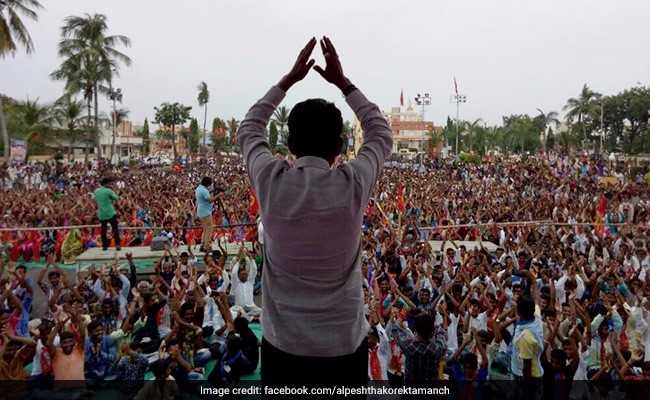
Alpesh Thakor is seen as part of a triumvirate that includes Hardik Patel and Jignesh Mevani, young activists who have challenged the BJP government in Gujarat recently
Till election results deem otherwise, Alpesh Thakor, 40, is suddenly a very big deal.
Other Backward Castes or OBCs make up 40% of Gujarat's population. Alpesh's own Thakor caste forms half of that group and is based mainly in the villages of north and central Gujarat. Small farmers and landless labourers, they were once employed as soldiers of the former princely states of Gujarat.
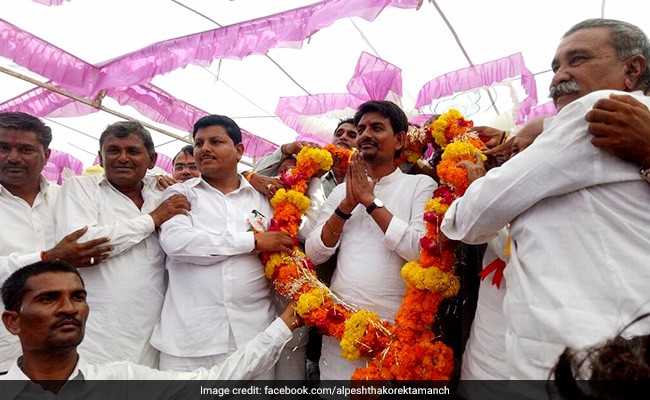
Alpesh Thakor was one of the important members of the Patidar agitation led by Hardik Patel
Then, in 2016, a fiery 22-year-old emerged overnight as a lightning rod for the powerful Patel or Patidar caste. Brandishing a sword, a turban on his head, Hardik Patel made his threat to the BJP clear: the Patels, once wealthy supporters of the party, would relocate politically unless they were given a share of reserved jobs and seats in state-run educational institutions. His call swelled to such immense proportions that it forced the BJP to change the Chief Minister - Anandiben was replaced by Vijay Rupani; 12 young Patel men were killed in clashes with the police; and Hardik's being banned from Gujarat for six months as part of the conditions for his bail after he was arrested and spent nine months in jail.
Inspired by Hardik and the scale of his disruption, Alpesh Thakor retorted in 2016 with the new "Ekta Manch" formed to represent around 70% of Gujarat's population (Other Backward Castes, Scheduled Castes and Scheduled Tribes). Its declared mission was to prevent "outsiders" - mainly higher castes like the Patels - from benefiting from affirmative action policies.
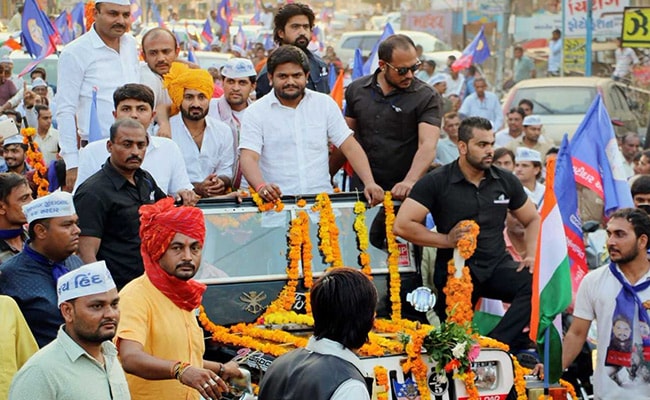
Hardik Patel is popular amongst the younger generation of Patidars
Alpesh Thakor's core team is drawn largely from his Sena. They are rough around the edges, shooting their mouths off, but expressions of acumen and ambition come naturally to them. BJP chief Amit Shah's focus on booth management - forming a small team that will round up and lead supporters to the booth on voting day - is being adopted rapidly by them. Their leader's cubicle is no larger than any other; the only sign of "Acche Din", they snigger, is the very large Mac that he uses.
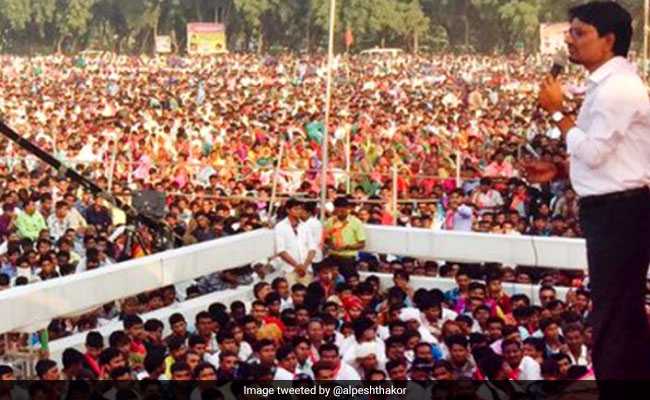
Other Backward Castes or OBCs make up 40% of Gujarat's population
Hardik Patel, likewise, has huge issues with reservation as it's currently implemented in Gujarat. 50% of all government jobs and educational spots are set aside already - that's the limit set by the Supreme Court. The beneficiaries are 146 castes who are categorized as OBCs and get 27%; the balance is divided among the weaker Scheduled Castes and Tribes. Hardik Patel wants the Patidars to get a cut. That's not possible without decreasing the entitlement of a section of the Other Backward Castes or OBCs. Allowing the Patels reservation would mean alienating the OBCs, which is why the Congress, now home to Alpesh Thakor, is having a hard time acceding to Hardik Patel, who has said his support to the party is contingent upon it urgently declaring how exactly it will extend reservation to the Patels, who form 15% of the population.
He insists that "the overall 27 percent cannot be touched" but is equally clear that within that group, castes like his own should get a bigger share while those who have already benefited should be confined to a smaller proportion.
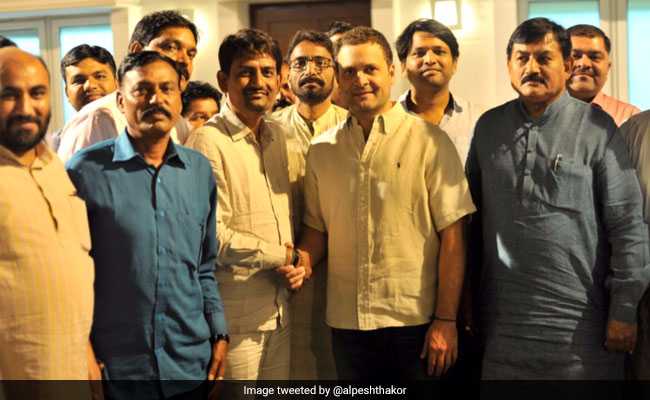
Alpesh Thakor, Rahul Gandhi and the Gujarat Pradesh Congress Committee chief Bharatsinh Solanki
"Let a comprehensive survey be carried out in Gujarat to determine the economic status of the upper castes. Let the findings be placed in the Vidhan Sabha, Lok Sabha and Rajya Sabha and before the President. Let them get their due. Why should we oppose it?" he asks, before stating, "I am fighting for the poor, the same as Hardik Patel, so we are natural allies".
Alpesh's father, Khodaji Thakor, switched from the BJP to the Congress in the mid-1990s. Alpesh denies that his first preference was the BJP but that party president Amit Shah was not prepared to give the Sena as many candidates as it sought, forcing a swerve to the Congress. "I first met Rahul Gandhi in 2006-7. I shook his hands, woh makhmal jaise naram the (his hands were velvet-soft). I never knew anyone's hands could be so soft. I have met him several times afterwards and one thing I can say with absolute conviction is that he is not a politician. He is a social worker. He thinks about the poor, is down to earth and speaks the truth...it has taken a long time to come for him to come into his own. But now I think he is ready to face any challenge," he affirmed.
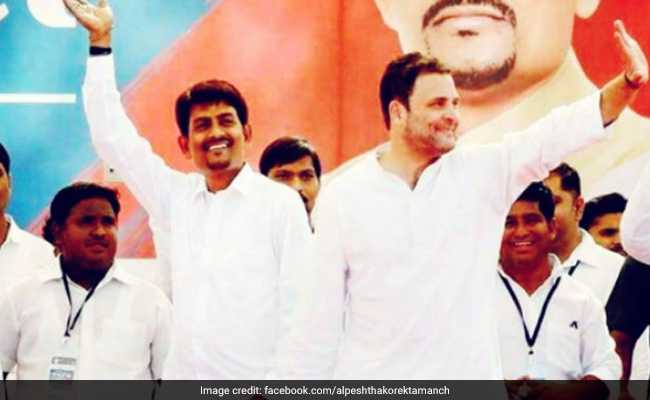
Alpesh Thakor will try to consolidate the OBC vote, currently divided between the Congress and the BJP
In the 1985 Gujarat election, Madhavsinh Solanki of the Congress forged an alliance of Kshatriyas, Harijans, Adivasis and Muslims, popularly known as KHAM, to register its biggest ever electoral victory in the state. In an updated iteration of that strategy, apart from Hardik Patel and Alpesh Thakor, the Congress is seeking support from Jignesh Mewani, the 35-year-old Dalit leader who completes the Gen Next of young Gujarati caste leaders, but is not as significant as them because Dalits form just 7 percent of the population.
The problem for the Congress is accommodating the myriad aspirations and castes who have traditionally backed opposing forces.
That doesn't stump Alpesh Thakor. "Everything is possible in politics" is his parting shot to me.
Track Latest News Live on NDTV.com and get news updates from India and around the world

